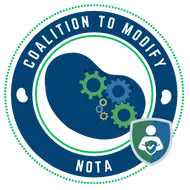
Modifying NOTA - Our Top Priorities are Ethics and Safety
Safeguarding the Slippery Slope
Skeptics Claim: Embracing a system that commodifies body parts creates a dangerous ethical precedent. Once we normalize the notion of buying and selling organs, we risk extending the practice to other body parts, potentially leading to the exploitation and dehumanization of individuals. It opens the door to a future where the wealthy can purchase health and longevity, further exacerbating existing social inequalities.
How we mitigate this concern:
Implementing ethical oversight and regulations that allow bioethicists, transplant healthcare professionals, living organ donors, and kidney disease patients.
Building broad societal consensus around the unique nature of kidneys and normalizing the compensation of these organs as we do with blood, plasma, eggs, surrogate pregnancies, etc
Normalizing Compensated Kidney Donations: Emphasize comparisons to existing practices of compensated biological donations, facilitate frequent, clear communication about the processes and safeguards in place, and engage in ongoing review and adjustment of strategies in response to societal attitudes.
""Compensating kidney donors does not equate to commodification. With careful ethical oversight and societal consensus, we can ensure the practice remains focused on maintaining donor safety above all else - while saving countless lives by creating a more equitable system for all donors and recipients."
- Kari Rancourt, Living Donor Coordinator / Non-Directed Kidney Donor
Implementing Ethical Oversight and Regulations
Ethical Oversight: Form an ethics committee consisting of bioethicists, transplant healthcare professionals, living organ donors, and kidney disease patients to ensure the process remains ethically sound.
Regulations: Develop clear, comprehensive regulations that guide the process of kidney donation, including eligibility, consent, compensation, and donor support. Ensure these regulations are consistently applied and regularly reviewed for relevance and effectiveness.
Protection of Donors and Patients: Prioritize the welfare and rights of both donors and patients in all decisions. Ensure that any system changes are not at the expense of those the system is designed to protect and help.
Building Societal Consensus
Public Education: Launch a robust public education campaign to inform the public about the unique nature of kidneys and the importance and safety of kidney donation.
Addressing Misconceptions: Address misconceptions about organ commodification and explain how regulated compensation for kidney donation differs from unregulated organ trade. Highlight the similarities with compensated donations of blood, plasma, eggs, and surrogate pregnancies.
Engaging Stakeholders: Engage stakeholders in constructive dialogue, including the medical community, potential donors, kidney disease patients, and the general public, to foster understanding and acceptance.
Normalizing Compensated Kidney Donations
Comparison with Existing Practices: Highlight how society already accepts compensation for certain biological donations such as blood, plasma, and eggs. Frame kidney donation in this context to help normalize it.
Frequent Communication: Communicate regularly about the processes and safeguards in place for compensated kidney donations. Show how these protections work in practice to maintain trust and confidence in the system.
Ongoing Review: Continuously review societal attitudes and adjust communication strategies accordingly to ensure compensated kidney donation is seen as an accepted part of our healthcare system.
Top Priorities: Ethics and Safety






